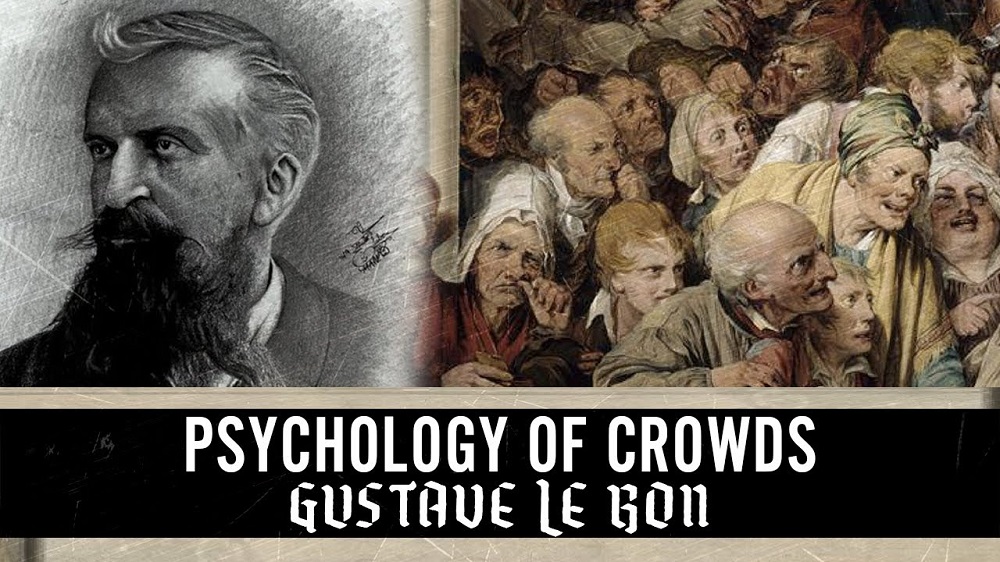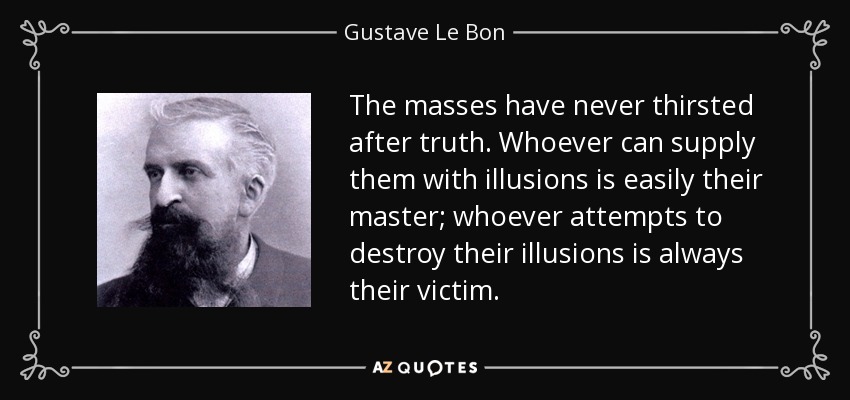Bok: «The Crowd» A Study of the Popular Mind — Om den menneskelige mental-fanatismen

Et krigsskrift og undersøkelse av mobbens flokkmentalitet
Dette er verk som jeg fikk anbefalt av en «podcast-venn» for en stund tilbake i forbindelse med en diskusjon, og det som i forbindelse med denne omtalen blir min andre gjennomgang av det.
Vedkommende som anbefalte meg denne boken er en skikkelig lesehest og forfatter, som leser både høyt og lavt om så meget. Som selve tittelen riktignok uttaler, er denne boken snarere å anse som en psykologisk introduksjon til masse-suggesjonens mekanismer og psykologiske aspekter vedrørende menneskelig flokkmentalitet enn hva den i dag kan sies å være vitenskapelig anrettet.
Da jeg selv, veldig sponant og avkortet, studerte det pseudovitenskapelige faget psykologi, var ikke denne boken på ‘syllabus-en-dei’, forståelig nok… etter som boken i dag og daværende, blant mange pseudointellektuelle fjoller og det på mange måter, kan sies å være såkalt «kontroversiell», noe som bør vekke en viss interesse.
I motsetning til filmene som det skrives om her, så kan jeg når det gjelder litteraturomtaler samtidig meddele at jeg således anbefaler bøkene jeg først omtaler. Denne boken burde sånn sett være grei for de fleste å lese. Den er dessuten meget enkel å finne gratis på internett.
Boken innbyr til flere forskjellige fascinasjoner, deriblant først og fremst generelle påpekninger og nærmere beskrivelse av flokkmentalitetens vesentligheter som pådriver av samfunns-evolusjonistiske bevegelser, dette i sterk kontrast med individual-psykologi.
Uunngåelig nok må slike utredninger innbefatte en viss grad av samfunnsanalyse generelt, og historiske beskrivelser som premisser. Bokens relativt eldre datering gjør imidlertid ikke den irrelevant—tvert om. Referansene som brukes er snarere meget opplysende og samtids-relativt oppfriskende; nye, på den måten, at dette gir lesingen enda litt merverdi. Et produktivt kriterie for å vurdere om en slik type fagbok er sterk, eller ikke, er hvorvidt betraktningene er mer et produkt av datiden enn hva de er holdbare i dag, og her er det liten tvil om at foruten visse drøftelser, så holder det meste seg fremdeles høyst relevant.
Og fordi boken jo er ganske gammel, er dens faglige beholdning, rent punktvis, kunnskapsvis datert, det vil si, at det er ingen store overraskelser og i alle fall banebrytende konseptuelle forklaringer, men påpekningene står likevel stødig og er på mange måter et slags historisk verk å regne mer i dag som hva det utgjorde i 1895.
Le Bon ble med dette, inkludert verker forut «Menn og samfunns 1881», en hoved-pioner innenfor masse-psykologiens felt. Edward Bernays m.fler har siden egentlig bare kjørt plagiat på Le Bon, og ikke særlig videreutviklet hans konseptuelle budskap.

Historisk skildrer og destillerer Le Bon for det aller meste ut i fra det Franske samfunnet, og dens utpregede opprørskultur, men er stadig innom med komparative referanser til andre stater og folkeslag og eksempelvis forskjellige folkekulturers fanatisme.
Boken er ganske spekket med referanser, nokså elegante og konkretiserende sitater. Inn i mellom disse kan verket egentlig også leses som en slags historiebok, da den inneholder flere beskrivelser, spesielt av Napoleon Bonaparte, som selvsagt ellers blir gjenstand for omfattende eksemplifiseringer og annet av betraktinger.
Det er mange måter å kategorisere og eventuelt plassere denne studien av fanatisme og flokkmentaliteten på, og Le Bon drøfter så og si det meste som for ham var tilgjengelig, over hele den sosiale og politiske linjen.
Mange av sitatene fremhevet nedenfor, speiler i stor nok grad hans resonnementer per hvert moment, og således meget effektivt i en større helhet. Oppsummerende sett, blir denne boken å egentlig forstå som en slags ‘makromanual’ for maktutøvere og statsmenn, noe den garantert ble lest av mange slike. Betraktningene inneholder også mer inngående kritikk av demokratiet og likestillingsmekansimene, sågar den Franske revolusjon, dens sosialisme og videre samt feminine styresett generelt. Alt per kapittel.
Jeg nøyer meg derfor herfra å simpelthen sitere diverse uthevelser fra de forskjellige kapitelene, gjennomgående kronologisk, og med eventuelt noen tilleggskommentarer, da dette blir å anse som den mest hensiktsmessige måten å oppsummere den ytterligere.
På den måten mener jeg samtidig man derfra ikke trenger å lese boken, selv om den er meget kort, for å i alle fall nokså greit forstå hvorpå Le Bon’s generelle standpunkt befinner seg, og derfra hvordan drøftelsene munner ut i sine respektive konklusjoner.
Jeg mener også at bokomtale av faglig nytte bør innebære at man faktisk forklarer bokens innhold, fra begynnelse til slutt. Dette i kontrast med skjønnlitterære fantasier, intellektuelt runk og eventyr, som folk selvsagt burde fordype seg i på egen hånd.
Likevel så er dette en kjapp lesning som alle politiske aspirerende burde få med seg, og i alle fall notere seg tittelen..
Side 1:
«…when crowds are being assembled, there result certain new psychological characteristics»
(..)
«To belong to a school is necessarily to espouse its prejudices and preconceived opinions.
extreme mental inferiority of crowds, picked assemblies included.»
«Men are ruled by ideas, sentiments, and customs—matters which are of the essence of ourselves. Institutions and laws are the outward manifestation of our character, the expression of its needs. Being its outcome, institutions and laws cannot change this character.»
Side 4:
«The great upheavals which precede changes of civilisations such as the fall of the Roman Empire and the foundation of the Arabian Empire, seem at first sight determined more especially by political transformations, foreign invasion, or the overthrow of dynasties. But a more attentive study of these events shows that behind their apparent causes the real cause is generally seen to be a profound modification in the ideas of the peoples.»
Side 6:
«Civilisations as yet have only been created and directed by a small intellectual aristocracy, never by crowds. Crowds are only powerful for destruction. Their rule is always tantamount to a barbarian phase. A civilisation involves fixed rules, discipline, a passing from the instinctive to the rational state, forethought for the future, an elevated degree of culture—all of them conditions that crowds, left to themselves, have invariably shown themselves incapable of realising.»
Side 8:
«The lowering of the intelligence and the complete transformation of the sentiments–The transformed sentiments may be better or worse than those of the individuals of which the crowd is composed—A crowd is as easily heroic as criminal.»
Side 9:
«I have shown elsewhere that all mental constitutions contain possibilities of character which may be manifested in consequence of a sudden change of environment.»
«(..) transformed into a crowd puts them in possession of a sort of collective mind which makes them feel, think, and act in a manner quite different from that in which each individual of them would feel, think, and act were he in a state of isolation.»
«From the intellectual point of view an abyss may exist between a great mathematician and his boot maker, but from the point of view of character (and in a crowd) the difference is most often slight or non-existent.»
Side 13:
«Taken separately, the men of the Convention were enlightened citizens of peaceful habits. United in a crowd, they did not hesitate to give their adhesion to the most savage proposals, to guillotine individuals most clearly innocent, and, contrary to their interests, to renounce their inviolability and to decimate themselves.»
Side 20:
«The simplicity and exaggeration of the sentiments of crowds have for result that a throng knows neither doubt nor uncertainty. Like women, it goes at once to extremes. A suspicion transforms itself as soon as announced into incontrovertible evidence. A commencement of antipathy or disapprobation, which in the case of an isolated individual would not gain strength, becomes at once furious hatred in the case of an individual in a crowd.»
Side 21:
«Managers of theatres when accepting pieces are themselves, as a rule, very uncertain of their success, because to judge the matter it would be necessary that they should be able to transform themselves into a crowd.»
Side 23:
«Had democracies possessed the power they wield to-day at the time of the invention of mechanical looms or of the introduction of steam-power and of railways, the realisation of these inventions would have been impossible, or would have been achieved at the cost of revolutions and repeated massacres. It is fortunate for the progress of civilisation that the power of crowds only began to exist when the great discoveries of science and industry had already been effected.»
Side 24:
«The howling, swarming, ragged crowd which invaded the Tuileries during the revolution of 1848 did not lay hands on any of the objects that excited its astonishment»
—Det handler om å blande seg inn og speile entusiasmen hos en fanatisk flokk for å eventuelt overleve, dette har jeg erfart og måtte praktisere selv, slik som dette, for min egen sikkerhet. (Video):
Side 26:
«Even when an idea has undergone the transformations which render it accessible to crowds, it only exerts influence when, by various processes which we shall examine elsewhere, it has entered the domain of the unconscious, when indeed it has become a sentiment, for which much time is required.»
Side 27:
«Crowds, being incapable both of reflection and of reasoning, are devoid of the notion of improbability; and it is to be noted that in a general way it is the most improbable things that are the most striking.»
Side 30:
«Intolerance and fanaticism are the necessary accompaniments of the religious sentiment. They are inevitably displayed by those who believe themselves in the possession of the secret of earthly or eternal happiness. These two characteristics are to be found in all men grouped together when they are inspired by a conviction of any kind. The Jacobins of the Reign of Terror were at bottom as religious as the Catholics of the Inquisition, and their cruel ardour proceeded from the same source.»
Side 34:
«Traditions represent the ideas, the needs, and the sentiments of the past. They are the synthesis of the race, and weigh upon us with immense force. A people is an organism created by the past, and, like every other organism, it can only be modified by slow hereditary accumulations.»
Side 38:
«Peoples are governed by their character, and all institutions which are not intimately modelled on that character merely represent a borrowed garment, a transitory disguise.»
Side 39:
«I have myself shown, in a work published some time ago, that the French system of education transforms the majority of those who have undergone it into enemies of society, and recruits numerous disciples for the worst forms of socialism. The primary danger of this system of education—very properly qualified as Latin(kvinnelig)—consists in the fact that it is based on the fundamental psychological error that the intelligence is developed by the learning by heart of text-books. Adopting this view, the endeavour has been made to enforce a knowledge of as many hand-books as possible. From the primary school till he leaves the university a young man does nothing but acquire books by heart without his judgment or personal initiative being ever called into play. Education consists for him in reciting by heart and obeying. «Learning lessons, knowing by heart a grammar or a compendium, repeating well and imitating well–that,» writes a former Minister of Public Instruction, M. Jules Simon, « it is a ludicrous form of education whose every effort is an act of faith tacitly admitting the infallibility of the master, and whose only results are a belittling of ourselves and a rendering of us impotent.»
(…)
«The working man no longer wishes to remain a working man, or the peasant to continue a peasant, while the most humble members of the middle classes admit of no possible career for their sons except that of State-paid functionaries. Instead of preparing men for life French schools solely prepare them to occupy public functions, in which success can be attained without any necessity for self-direction or the exhibition of the least glimmer of personal initiative.»
Side 53:
«Affirmation pure and simple, kept free of all reasoning and all proof, is one of the surest means of making an idea enter the mind of crowds. The conciser an affirmation is, the more destitute of every appearance of proof and demonstration, the more weight it carries. The religious books and the legal codes of all ages have always resorted to simple affirmation.»
Side 64:
«The task of the philosopher is to investigate what it is which subsists of ancient beliefs beneath their apparent changes, and to identify amid the moving flux of opinions the part determined by general beliefs and the genius of the race(folket).»
Side 70:
Om stormingen av Bastillen og massens fanatiske massakrering
«An act of this kind may be considered crime legally but not psychologically.»
Side 79:
«Committees under whatever name, clubs, syndicates, &c., constitute perhaps the most redoubtable danger resulting from the power of crowds. They represent in reality the most impersonal and, in consequence, the most oppressive form of tyranny. The leaders who direct the committees being supposed to speak and act in the name of a collectivity, are freed from all responsibility, and are in a position to do just as they choose.
Robespierre wielded absolute power. The moment this frightful dictator separated himself from them, for reasons of personal pride, he was lost. The reign of crowds is the reign of committees, that is, of the leaders of crowds. A severer despotism cannot be imagined.»
Side 83:
«The splendour of genius makes itself less felt in political assemblies than anywhere else. They only give heed to eloquence appropriate to the time and place and to party services, not to services rendered the country.»
Side 91:
«With the definite loss of its old ideal the genius of the race entirely disappears; it is a mere swarm of isolated individuals and returns to its original state–that of a crowd. Without consistency and without a future, it has all the transitory characteristics of crowds. Its civilisation is now without stability, and at the mercy of every chance.»





